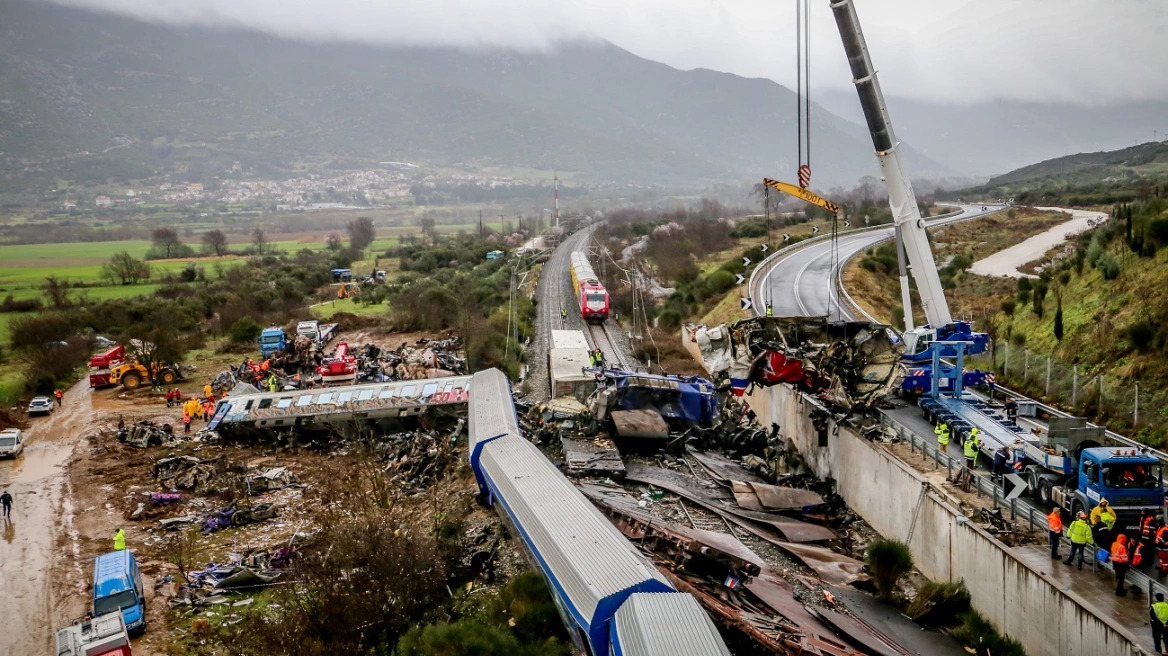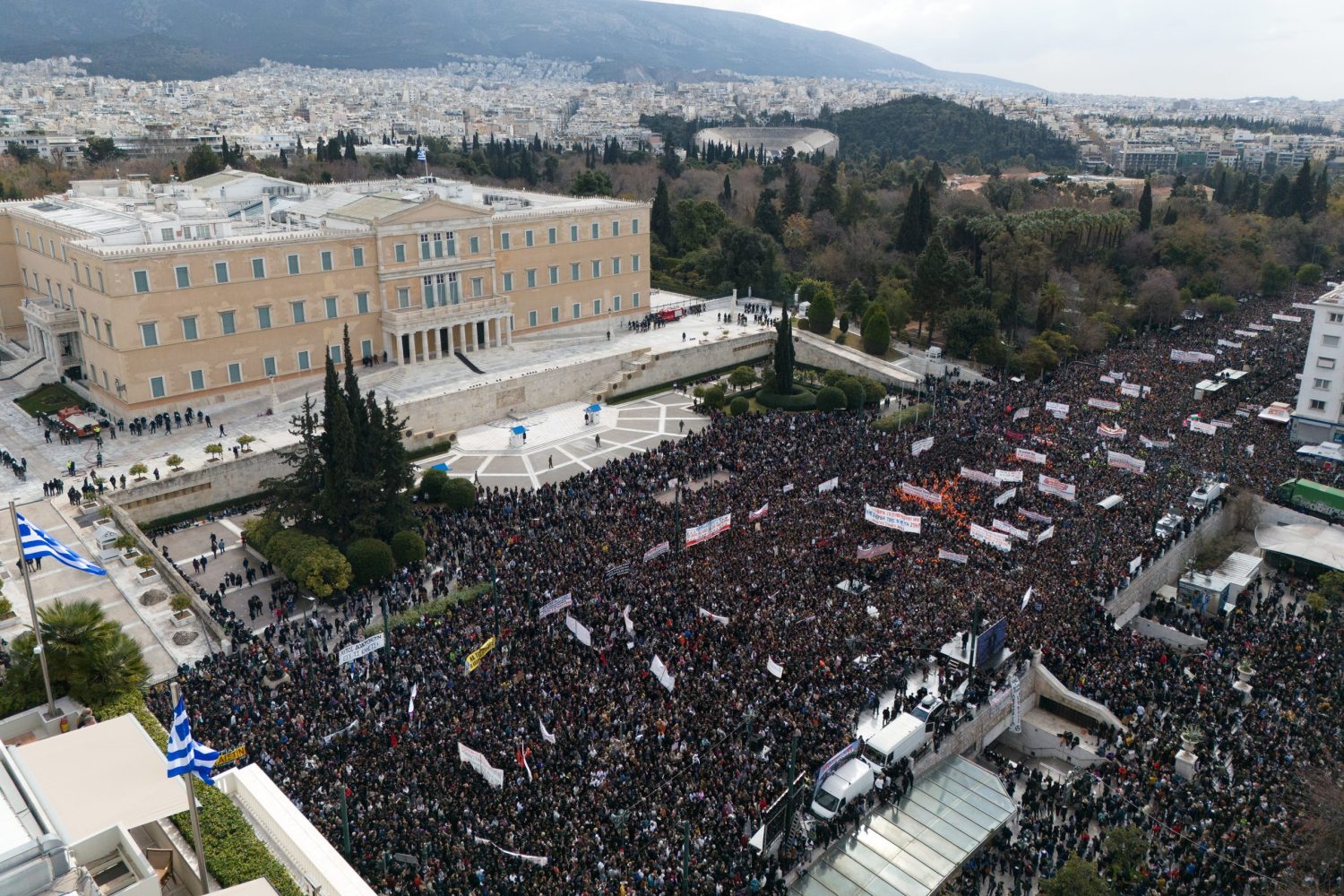by Alexandros Dimitrios Poulakis

On 28 February 2023, Greek society experienced one of the worst train accidents in its history. A head-on collision between a passenger train and a freight train near Tempi claimed 57 lives, most of them young students. The public debate in the early days was dominated by narratives about technical problems and human errors, but very quickly it turned out to be a deeper systemic crisis, with deep roots in institutional decay, opaque corruption and chronic political negligence. It would therefore be a tragic mistake to view the Tempi as an isolated incident, without realizing that it is directly linked to the chronic underinvestment in railways, mismanagement and of course the lack of accountability of the state for the infrastructure and transport system.
After the first numbing of society, the response was tremendously strong, with thousands of demonstrators in the streets in all parts of the country, demanding justice for the victims, in a general context of questioning the ability of the state to protect its citizens. What followed was a familiar cycle of blame, resignation, and short-term political management – leaving untouched the structural deficiencies that allowed such a tragedy to occur in the first place.

This article aims to highlight the need for our country to move on to more substantial and profound reforms and not just some bureaucratic fixes or ad hoc inquiries. The creation of a permanent citizens’ assembly on infrastructure and transport, a deliberative democratic body with a clear mandate to oversee, advise, and scrutinize public policy in these critical domains. The aim is not to replace experts or elected officials, but to inject democratic legitimacy, transparency, and moral accountability into a system that has repeatedly failed its people.
The Tempi Tragedy
The Tempi train disaster laid bare a long-standing institutional malaise in Greece’s public administration. Although framed initially as the result of human error or poor communication, investigations quickly revealed structural deficiencies: outdated infrastructure, incomplete safety systems, inadequate staffing, and a lack of regulatory enforcement (Kathimerini, 2023). Yet these technical failures were only symptoms of a deeper political disease—one marked by fragmentation, opacity, and impunity.
The country faces long-standing problems of clientelism, poor planning and lack of accountability (Featherstone, 2005). Transport and infrastructure have not escaped this rule. Projects are often driven by clientelist interests rather than public need, and accountability mechanisms are routinely bypassed or ignored (Trantidis & Tsagkroni, 2017). Various independent bodies have highlighted delay, over costing, and non-compliance with safety rules.
This institutional dysfunction is not just a question of inefficiency; it reflects a crisis of democratic legitimacy. When citizens see public officials evade responsibility, when safety becomes negotiable, and when loss of life is met with vague promises of reform, trust in democratic institutions erodes (Norris, 2011). The problem is not the absence of laws or procedures, it is the lack of credible, accountable, and participatory governance.
The Tempi tragedy thus symbolizes more than a railway failure. It stands as a moral indictment of a state that has failed to listen, to protect, and to learn. It is in this context that any meaningful reform must begin—not with a new minister or committee, but with a new political commitment to public accountability and democratic inclusion (Smith, 2009; Fung, 2006).
The Proposal of a Permanent Assembly
In the aftermath of the Tempi disaster, Greece needs more than token responsibility or transient managerial reform. What Greece needs is a structural intervention that allows citizens to participate genuinely in decisions that have immediate implications for public safety, resource management, and infrastructure planning. A permanent citizens’ assembly on transport and infrastructure is such an intervention – an institution innovation combining democratic legitimacy and deliberative depth.
A citizens’ assembly is a deliberative group of randomly selected citizens representative of the demographic of the nation. Members are often selected via civic lottery (sortition), paid for their time and supported by independent facilitators and experts to facilitate informed, respectful and balanced deliberation (Smith, 2009). These gatherings have been applied to solve sophisticated policy problems ranging from Irish constitutional reform (Farrel et al., 2020).
Compared with ad hoc or one-time deliberate processes, a permanent assembly offers institutional continuity and sustained citizen engagement. It institutionalizes a site of civic review, public scrutiny, and democratic accountability of long-term infrastructure planning, maintenance, safety standards and public investment. Permanent assemblies also make it possible for institutional memory to be built, which improves the capacity of the assembly to track policy effects, carry on recommendations and build expertise over time (OECD, 2021)
Greece’s current institutional framework lacks robust participatory channels for civic engagement. While public consultation is foreseen in the Constitution in article 73, it is narrow, non-binding and tends to be procedural. A permanent citizens’ assembly could be established as a pilot under ministerial decree or parliamentary law and then progressively more formally institutionalized through constitutional or legislative reforms.
During times of public calamity and institutional failure, democratic states are not only put to the test as regards their capacity to deliver policy, but as regards their capacity to listen, learn, and restore trust. The tempi disaster was definitely just a technical failure but a profound failure of the moral and democratic contract between state and citizens. Any genuine response must therefore go beyond policy or bureaucratic reform and engage with the key question of legitimacy.
Why Should We?
Political legitimacy rests on grounds greater than legal authority; it depends on popular perceptions of institutions’ fairness, responsiveness, and openness (Tyler, 2006). In Greece, widespread failures on public security along with low citizen participation in policymaking have created a perception that the government is closed, secret, and unaccountable. A citizens’ assembly offers an institutional solution to this perception. By putting serious decisions within the reach of ordinary citizens, it is a step towards collective responsibility and democratic transparency (Fung, 2006)
Besides legitimacy, there is a deeper ethical requirement; to acknowledge harm and create pathways for moral repair (Walker, 2006). After Tempi, the general public and the victims’ families were not only upset, but also morally offended – a sentiment that the state had violated its duty of care. A space of deliberation, where citizens consider, question, and help re-shape the institutions that fail them, is a path towards symbolic and instrumental justice. It does not contradict the tragedy, but it respects the reaction by voicing for those too often forgotten by policy.
Timeless accountability processes like parliamentary scrutiny, audit, and judicial review are required, but they also have a tendency to lag behind events and are uninteresting to the wider public. Permanent citizens’ assemblies have a quality of proactive accountability: a permanent institution can monitor decisions as taken, question first before disaster occurs, and identify issues in the system in real-time (OECD,2020). Its proactive nature is especially needed in high-risk, high-cost sectors like transport and infrastructure.
The incorporation of deliberative practices into formal government is not a final solution but is a movement toward institutional resilience for readjusting capacity, rebounding, and innovating in the midst of a crisis like Tempi. Empirical research suggests that participatory institutions, when they are well-designed, enhance the legitimacy of policies, allow for higher-quality decision-making, and more constructively build civic strength (Smith, 2009; OECD, 2020). In the Greek case, where the government is distrusted and policy horizons are short, a stable deliberative forum might fulfill the dual function of early warning system and public watchdog.
Conclusion
The Tempi train crash exposed not only systemic failures in Greece’s infrastructure and transport management, but a more profound crisis of democracy – a crisis of trust, legitimacy, and moral responsibility. When confronted with such basic institutional breakdown, symbolic responses and technocratic solutions are inadequate. A structural, participatory response placing citizens at the forefront of democratic governance is what is needed.
A permanent citizens’ assembly on transport and infrastructure is not a radical experiment, is a prudent democratic innovation, grounded in a growing international research and practice base. It offers a realistic means to increase transparency, foster accountability, and bridge the distance between policymakers and the public. Above all, it is a forum for moral accounting and democratic reconciliation-an institutional space in which the public can engage with the record of failure and help construct a safer and more just future.
Greece may be a leader-not only in the way that it responds to a tragedy, but in reshaping what an ethical, responsive and inclusive state could be. Having a citizens’ assembly will not take away the past, but it can change the future by rethinking how decisions get made, who gets to make them, and in whose name, they get made. Let’s make our Democracy stronger.
Alexandros Dimitrios Poulakis is a political scientist with distinctions and a Master’s in Crisis Management, focusing on corruption in humanitarian interventions. He is pursuing a PhD at Aristotle University of Thessaloniki on participatory budgeting in Greece. He works as a Human Dimension Expert at Callisto and is co-founder of DEMOTRUST, a youth-led think tank promoting transparency, human rights, and citizen engagement in Greece. He has participated in major Council of Europe conferences on participatory democracy.